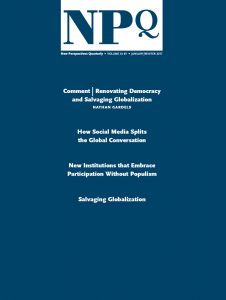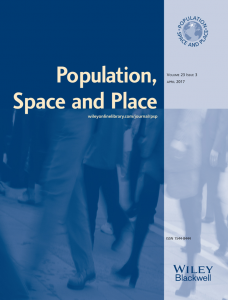Interview with Professor Xiaogang Wu, Associate Editor for Sociology Compass

Sociology Compass is delighted to welcome Professor Xiaogang Wu to lead the Social Stratification Section as Associate Editor, along with Dr Zhuoni Zhang. Xiaogang is Professor of Sociology at New York University Shanghai. The Associate Editor role at Sociology Compass is to lead on the commissioning of state-of-the-art review articles under dedicated subject areas. We took the opportunity to talk to Xiaogang about his research background and aims for the social stratification section as he and Dr Zhang join the Sociology Compass editorial team. For an interview with Dr Zhang see here.
Please tell us about your research background and how you came to study sociology?
I received my bachelor’s degree and master’s degree in sociology from Renmin University of China and Peking University, respectively, and my PhD in sociology from University of California, Los Angeles. Before I moved to Hong Kong to assume a faculty position, I had spent two years at University of Michigan, Ann Arbor, as an Andrew Mellon post-doctoral fellow and a lecturer in sociology. I moved to NYU Shanghai in Fall 2020 after 17 years of teaching at Hong Kong University of Science and Technology (HKUST). In my early career, I studied the labor market process in transition economy, and the role of socialist institutions in stratification processes in China. I then extended my research interest in social stratification and mobility to educational inequality, and more recently, developed comparative research interests in Hong Kong and Shanghai.
In carrying out my research, I mainly employ quantitative methods to analyze population-based panel survey data that my research team has collected in more localized contexts, such as the Beijing College Students Panel Survey [BCSPS]) (2009-2013), the Hong Kong Panel Studies of Social Dynamics (HKPSSD) (2011-2021), and the Shanghai Urban Neighborhood Survey [SUNS] (2017-2019), as well as other publicly available and national representative data, such as the Chinese General Social Surveys (CGSS) and China Family Panel Studies (CFPS). These comprehensive data allow me to examine a variety of sociological topics, such as gender, ethnicity, identity, subjective class, public opinion, although education, inequality and stratification remain the core of my research interests.
While I was in high school, I came across a small book translated from English, What is Sociology? An Introduction to the Discipline and Profession. At that time I did not know how famous the author Alex Inkles was. The Chinese version was published in 1981 and only 1,000 copies were printed, but somehow, I had a chance to read the book in a small Chinese town in the mid-1980s. When I chose majors, I listed sociology as my first choice and became the first cohort of sociology undergraduate students at Renmin University of China (sociology as a discipline once was abolished during the Maoist era and re-established in 1979). I remained in the profession since then, for 35 years to date.
What would you consider the most compelling or critical questions for your area of research right now?
At present, we are living in an era of great rising Inequality and declining social mobility. In recent decades these have become pressing issues with profound consequences that the governments of many countries have attempted to tackle. When highlighting the importance of studying inequality and stratification, I often quote Charles Dickens, “It was the best of times, it was the worst of times, it was the age of wisdom, it was the age of foolishness.” Social scientists ought to provide wisdom and insights to monitor the trends, to identify the causes, and to provide policy solutions to mitigate the social and political consequences of such challenges. To advance these inquiries, we may focus on some critical issues in this area of research as outlined in the following:
- First, how emerging new social trends shape the patterns of inequality and stratification processes. These trends include demographic transition, globalization, digitalization that may have profound impacts on the occupational and labor market structures.
- Second, how inequalities are produced in different social contexts. We may shift the research focus from the description of the inequality patterns to the process or mechanism through which inequalities are created. Thus, it is necessary to adopt various innovative methods in this research field.
- Third, what are the social and political ramifications of the rising inequalities. More attention needs to be paid to the subjective dimension of social stratification, namely, how inequalities are perceived and translated into individuals’ attitudes, and social and political actions.
- Finally, what public policy can be implemented to mitigate the negative impact of rising inequalities. Research on inequality and stratification should be more engaged specifically in the discussions on the social and economic policies and their implications for dynamics of inequality and poverty.
In your view, what does sociological research contribute to society? Why does it matter?
In my view, sociological research can contribute to society in several ways. First, we employ scientific methods to obtain facts and detect social trends (e.g., tracking inequality) that go beyond individuals’ impressionistic direct experience. Second, individuals living in this contemporary era may be better informed to make choices under the structural constraints. In this regard, sociological research can guide individuals to make realistic choices. Finally, sociological research may also help us to identify social problems, place them in specific historical contexts, and find policy solutions to tackle these problems if possible, or at least to find some ways to mitigate the negative impact of these problems. In the end, sociological research can help us to understand ourselves and the society surrounding us, and to make our society a more liveable place.
As Associate Editors for the Social Stratification section of Sociology Compass, what are you at Dr Zhang looking for when commissioning and assessing Review Articles?
We would like to invite scholars to contribute to the review articles through the summary of existing literature and discussion about the direction of future research in the field. We are looking for both conventional topics and innovative topics that are relevant to social stratification research. For conventional topics, we would like to emphasize the empirical evidence from non-western societies that could potential challenge and revise the existing theories on those topics. For example, empirical findings from the East Asian contexts may be compared and contrasted to the existing knowledge of European or North American countries to enrich the literature in the field.
The second line of our interests is to explore challenges of new socioeconomic transformations to the concepts, measures, and theoretical paradigms that adopted in narrowly defined social stratification research field. For instance, acceleration of digitalization and the rise of the platform economy may transform the work and labor market, likely undermining occupation as the key concept in social stratification research.
We’re particularly interested in authors from interdisciplinary backgrounds and research work using innovative methods. We also wish to extend the peer review community to draw expertise both from those outsides of sociology and from those in relevant subfields within sociology. Those articles about major non-Western societies of the Global South are particularly welcome.
What inspires you to be involved in Sociology Compass as an Associate Editor?
I have been the editor-in-chief of the Chinese Sociological Review (CSR) since 2011 (CSR, ISSN: 2162-0555 [print], ISSN: 2162-0563 [online]). Under my editorship, the CSR (originally known as Chinese Sociology and Anthropology) was transformed to become a premier international peer-reviewed journal devoted to the study of Chinese society and culture. This role has given me opportunities to know many scholars through their work and the editorial experience has been very rewarding. SoCo is a different kind of journal that mainly publishes review articles by specialists but accessible to non-specialists. I think that this is exactly what professional sociologists need to reach out.
Research in social stratification and mobility is a highly technical field in our discipline, but the issues we study are of great interest to the general public. The social stratification section of Sociology Compass (SoCo) will be a platform for colleagues to reflect on what has been achieved and on future research direction, and share these reflections and understanding to a broad audience. As the associate co-editor of the social stratification section, I wish the insights and perspective based on evidence and experience from non-western societies can be heard in particular.
For readers and researchers new to your discipline, what would you put at the top of their recommended reading list?
I recommend three books for readers new to the section of social stratification:
1. Durable Inequality, by Charles Tilly (1998)
The first presents a powerful new approach to the study of persistent social inequality. Tilly argues against the idea that inequality can be understood gradationally, and highlights the categorical nature of social inequality. Unlike many other contemporary analyses that explain inequality by gender, class, race/ethnicity, Tilly employs one concept to account for how inequality was generated. People draw boundaries between themselves and ‘others’, and so form “categorical pairs”. Tilly’s book outlines four social mechanisms that create and maintain paired and unequal categories: exploitation, opportunity hoarding, emulation and adaptation. While the first was borrowed directly from Marx and the second was drawn from Weber’s notion of social closure, the last two processes are more original and arresting. By emphasizing the last two processes, the book presents an account for inequality more sensitive to the interplay between micro and macro contexts, and to the fluidity of historical process.
2. Capital in the Twenty-First Century, by Thomas Piketty (2014)
The second is a “sociological” book written by a French economist, Thomas Piketty. The central thesis of the New York Times best seller book is that, when the rate of return on capital is greater than the rate of economic growth over the long term, the result is concentration of wealth, and this unequal distribution of wealth causes social and economic instability. Inequality is not an accident, but rather a feature of capitalism, and thus can only be reversed through state interventionism. Unless capitalism is reformed, the very democratic order will be threatened He proposes a global system of progressive wealth taxes to help reduce inequality. The book combines historical perspectives and rigorous data to address one of the most important issues that many countries have attempted to tackle.
3. Sociology as a Population Science, by John H. Goldthorpe (2016)
The third book written by one of most prominent stratification scholars, British sociologist John Goldthorpe, provides a new rationale for recent developments in sociology which focuses on establishing and explaining probabilistic regularities in human populations. In this concise and accessible book, Goldthorpe shows how sociology has become more securely placed within the ‘probabilistic revolution’ that has occurred over the last century in the natural and social sciences alike, and this central argument is illustrated with examples from social stratification, the sociology of the family, and the sociology of revolutions, to advocate quantitative sociology.
Professor Wu is Associate co-Editor with Dr Zhuoni Zhang, whose interview can be read here.
Professor Wu and Dr Zhang take over this Associate Editor position from Dr. Joan Maya Mazelis, who finishes her term at the end of 2022. We’d like to thank Dr. Maya Mazelis for her dedication and commitment to leading the Social Stratification section over the past years. You can take a look at the articles published during this term here.





1540-6210/asset/society_affiliation_image.gif?v=1&s=812a48e1b22880cc84f94f210b57b44da3ec16f9)
